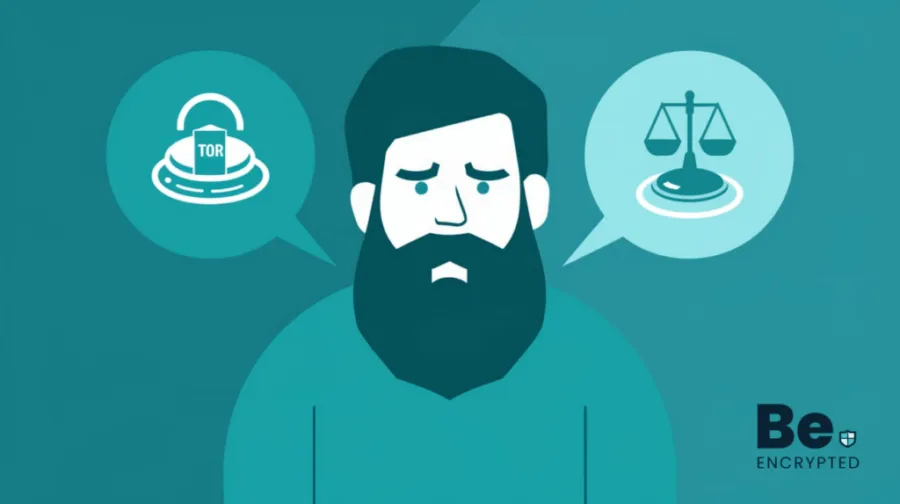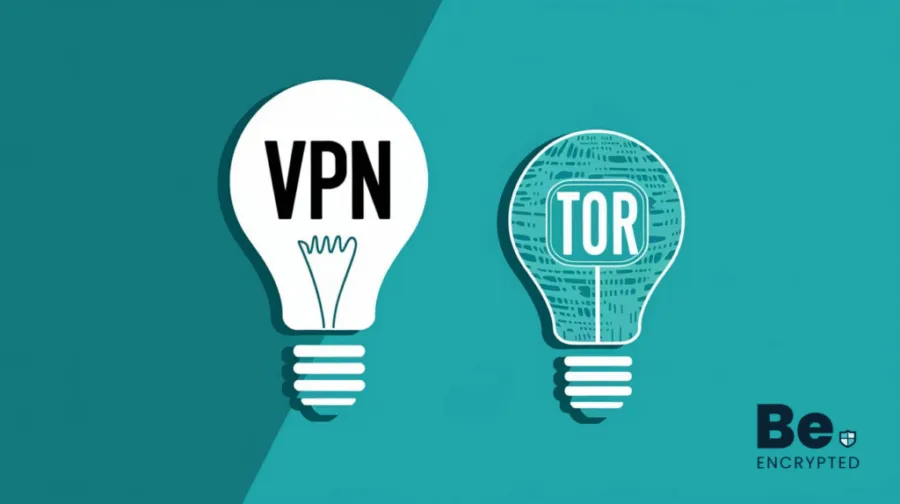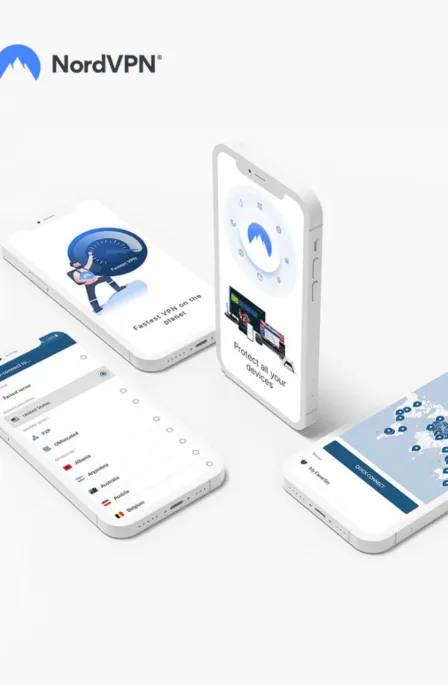Tor is one of the most popular private browsers in the industry. However, most people avoid using it as it lies in the grey area and ask questions like, “Is Tor illegal?” Well, it is not. The legality of this browser depends on the country you are currently in and your browsing activity.
Note: You are still traceable using the Onion browser. Therefore, we recommend using a reliable VPN like NordVPN with the private browser.
Anonymity and privacy on the Internet are becoming more critical than ever. The Tor browser is the most famous among the many solutions deployed to improve online anonymity. It was designed to provide internet freedom, privacy, and an anonymous connection without any tracebacks.
With Tor, users can prevent online tracking, surveillance, and access to hidden or unindexed websites through the .onion sites. This raises the most obvious question: Is Tor illegal to use?
The Tor browser is free and legal software. But if it’s used to perform illicit activities like drug trafficking, financial fraud, and cybercrimes, then using the Tor browser becomes illegal. What are the consequences of this, and are they dangerous? Let’s explore the topic in more detail to learn more.
How Tor Browser works
Tor hides your IP address and encrypts your traffic using three layers. The nodes used in Tor only know the next node’s and previous node’s addresses but do not know the data contents. This ensures the relays can trace their path in the network without reading the data.
Tor relays traffic from your device to a publicly listed node (entry node), bouncing the data to a middle node. The middle node then bounces and relays the data to the third node (exit node), which spits it to the public internet. This allows your device to communicate with the world with a different IP address that may belong to a foreign country. So, don’t be surprised when you see content irrelevant to your location or even displayed in a foreign language.
Alternatively, if your main goal is to bypass internet blocks and censorships, you may configure your Tor Browser to use bridges. Unlike regular Tor relays, bridge IP addresses are not publicly listed, which makes it difficult for government agencies and web services to blacklist the IP addresses. Also, Tor does not support torrenting in the network but can route TCP traffic of any kind.
Is using the Tor Browser illegal?

Tor browser is safe to use even if you access the dark web. However, the Tor browser becomes unlawful when people use it to access the dark web and perform illegal activities. According to a report, 57% of the .onion sites support illegal activities. Here’s the list of the most common activities performed on the darknet:
- Human trafficking
- Buying and selling of drugs, weapons, personal information, and other illegal stuff
- Financial fraud
- Hiring killers and hackers
- Cybercrimes like malware and ransomware
- Uploading and downloading pirated content
In a 2016 study, researchers Daniel Moore and Thomas Rid determined the intensity of illegal activities on the dark web. They exposed 5,205 websites, 48% containing no content, while half hosted illegal activities. The top 423 websites promoted trading and illegal drugs, and 327 sites supported financial crimes like money laundering and the trade of stolen account numbers and credit cards.
Anyone who participates in such activities is using the Tor browser illegally. The results of such activities are worse because the Tor browser doesn’t provide enough online protection. They risk online privacy and increase the risk of online surveillance and the chances of getting caught.
For example, a Freedom Hosting service provider went offline in 2013 after the FBI sought a 28-year-old Irish man. The man was charged with promoting and distributing online material related to child abuse.
Is Tor Browser anonymous?
Today, Tor is the best anonymity tool for web browsing, but it must still be perfect. Researchers worldwide are finding ways to improve Tor’s anonymity and performance features, while others are trying to develop the next-generation anonymity tool. On the other hand, governments are investing heavily in finding ways to break Tor’s anonymity features.
In addition, your ISP can see when you are using a Tor browser, which takes away part of your privacy. Your browsing behavior also determines the level of anonymity that Tor can give you. If you intentionally give out your accurate details when browsing, Tor cannot protect you. Some exit nodes may also be malicious; their operators may spy on your activities and uncover your identity.
If you want to experience anonymous browsing using the Tor browser, we recommend using the browser with a VPN.
Is Tor safe?
Tor protects your privacy and anonymity but cannot protect you from all the dangers of the internet, especially the dark web. Also, it can’t protect you from mistakes like clicking malicious URLs and oversharing. While it is much safer when browsing using the Tor browser, it is not 100% safe. The biggest weakness of the Tor browser is the exit node where decryption occurs.
The owner of the exit node has malicious intentions; they could monitor your traffic and even intercept sensitive data. Assuming an oppressive regime runs the node, they could monitor all the traffic exiting through it. In the past, Tor users have suffered attacks where hackers exploited a JavaScript vulnerability.
We recommend using a reliable VPN with a Tor browser to add another layer of anonymity when browsing. This way, you can protect all your online activities, not just web traffic, and hide your actual IP address from the Tor nodes.
Interesting facts about Tor

Tor has a dark side
While the dark web is a haven for activists, whistleblowers, and journalists, it is also used for many illegal activities. Tor is mainly associated with the unregulated dark part of the internet that resembles the Wild West. Therefore, tread carefully to avoid losing data, money, or morals. Use the following tips.
- Use a VPN to add another layer of privacy.
- Watch out for cybercriminals; they are everywhere.
- Avoid engaging in illegal activities.
- Get out when you realize suspicious activity.
Tor can be slow
Tor is slower than other browsers because your traffic must go through a series of encryption and decryption on various nodes. Also, the network may sometimes experience congestion during peak usage, leading to slower speeds and higher latencies. Only consider using Tor for light browsing or ensure you have an intense connection speed for transmitting large amounts of data. Otherwise, some connections may take forever.
Tor is legal in most places
Tor is perfectly legal in most countries. It only becomes illegal when you use it to engage in illegal activities. Remember that your ISP may mark you for surveillance if they detect you are frequently using Tor. Therefore, the best practice is to combine Tor with a reliable VPN. Connecting to a VPN before launching Tor prevents your ISP from knowing whether you are using Tor.
Tor is free
Tor is a free and open-source project. It started as a US government-funded project for anonymous communication within the Navy. Today, Tor is open to the public, and its code is available for public scrutiny, which makes it trustworthy. Therefore, you can download the Tor browser to your device from the official Tor Project website and use it to explore the internet.
Multilayered security
Tor uses an array of technologies to protect your privacy and anonymity when browsing:
- Encryption: Tor encrypts and relays your traffic through volunteer nodes to hide your identity.
- IP masking: Tor conceals your IP address from third parties so no one can know who you are.
- Bin your history: Tor clears browsing records (form data, cookies, history) when you close tabs.
- Blocks fingerprinting: Tor prevents websites from developing a unique profile about your device and browser by making your digital fingerprints look like that of other Tor users.
- Blocks trackers: Tor isolates each website you visit to protect you from third-party trackers.
Tor’s Law of Threes
Tor protects your privacy and conceals your identity using three layers of IP address masking and encryption. Your traffic bounces through random servers, your IP address changes and your encryption layer peels off like an onion at each stop. The third node makes the final decryption and sends the traffic to the public internet. This is why it is impossible to monitor your online activities and also why Tor is slow.
How can I use the Tor browser?
Tor is an excellent anonymity tool that helps users bypass censorships, access geo-restricted content, and visit the dark web. People who want to keep their internet activity private, such as activists, whistleblowers, and journalists, commonly use it. Many organizations that value their privacy also use it.
In countries under repressive regimes and restrictions on free speech, activists and the general public use Tor to bypass online censorship and access blocked websites. They also use Tor to protect their information and identities. For instance, during the 2010 Arab Spring, people used Tor to access social media and blocked news websites.
Tor lets you confidently participate in sensitive topics online without revealing your identity. In addition, it provides a safe and private avenue for people who have suffered social injustices like rape and domestic abuse to get help without exposing themselves.
The Tor network only protects the data that goes through the Tor browser and cannot protect you when using other applications. Therefore, you need a quality VPN to protect yourself when using other applications on your device.
How to use the Tor Browser on mobile devices
Follow these steps to install and setup the Tor browser on Android:
- Open the Google Play store or Apple App Store and search the official Tor browser. Ensure you install the version with the purple logo since it is stable.
- After installation, open the application and tap ‘Connect.’ Depending on your connection speeds, it may take a minute or longer.
- Check your IP address to see if it is working. Use online tools like whatsmyip.com. Also, go to the hidden wiki, a dark web directory, to see if you can access it with the current configurations.
- You can now explore the dark web using the Tor Browser on your mobile device.
- Always use a VPN like NordVPN while using the Onion Browser.
How to use Onion Browser on macOS and Windows
- Download the Windows installer for the Tor browser from the official Tor Project website.
- Open the download and follow the installation wizard to complete the installation.
- On Mac, the wizard instructs you to drag the Tor icon to the Applications folder.
- Connect and ‘configure.’ Click ‘Configure’ if you are in a region with heavy censorship. It will then guide you in configuring a pluggable transport.
- Check your IP address to see whether it is working. Use online tools like whatsmyip.com. Also, go to the hidden wiki, which is some kind of a dark web directory, to see if you can access it with the current configurations.
- Start browsing anonymously.
Legal uses of Tor
While Tor has gained fame as a playground for cybercriminals and illegal activities, it is also a paradise for those seeking privacy to conduct legal activities without fearing criticism and backlash. Here are some legal uses of Tor:
- Penetration testing: Cybersecurity experts use the Tor network to emulate real-world cyberattacks and analyze their impact and control measures.
- Whistleblowing: Whistleblowers can reveal hidden secrets affecting society while hiding their identities. However, some whistleblowers may leak sensitive state secrets, which is a criminal offense.
- Surveillance: Law enforcement agencies use Tor to surveil and track criminals and terrorists.
- Activism: Political dissidents and human rights activists use Tor to communicate and organize rallies.
- Journalism: Journalists in authoritarian regimes use Tor to disseminate information and hide their sources.
What makes the Onion Browser legal
As mentioned earlier, using the Tor browser is not illegal, but its association with the dark web to perform illegal activities makes it illegal. Below are the most prominent legal reasons for using the Tor browser:
Bypassing censorship
Using the Tor browser to circumvent internet censorship is also legal, and there’s nothing in it. The browser can help users circumvent internet restrictions and freely browse the deep internet world. It has released its new 11.5 version that automatically bypasses censorship.
Using this new version, you can connect to the Tor browser from heavily censored countries and even from countries where it’s censored, such as Armenia, China, Iran, and Turkey. This is an excellent initiative for journalists in authoritarian regimes who cannot access the Tor browser. The newer version requires no manual configuration to unblock the Tor browser and ensures a safe and secure browsing experience.
Anonymous web communication
The Onion browser was explicitly designed for anonymous communication, so if someone uses it for this purpose, there’s nothing illegal. The Tor exit nodes jumble up the internet traffic and conceal the IP address, making it difficult for anyone to spy on or trace your traffic and activities. The new 11.5 Tor browser version further ensures that the users’ online privacy is not compromised.
The default browsing mode has been changed to HTTPS-only, establishing a secure connection between the server and the client through a protected tunnel.
Journalists and whistleblowers often use the Tor browser to protect their sources and keep their information private. Similarly, social and political activists use the Tor browser to communicate and organize protests and rallies privately.
Accessing Blockchain network and securing cryptocurrency
Another impressive and legal reason for using the Tor browser is to secure cryptocurrency transactions and the Bitcoin network. The most significant privacy risk of Bitcoin is the Bitcoin blockchain. It is like a public log of transactions where the analysts can match anyone’s latest transaction with the previous one to follow the money trial.
Moreover, Bitcoin transactions work by broadcasting to Bitcoin supernodes. These nodes propagate the transaction to the rest of the Bitcoin network until it becomes recognized. If the user remains unprotected from the supernodes, learn about their IP address. This way, anyone can know about your Bitcoin transactions. This is where the Tor browser plays a pivotal role.
The IP address remains hidden by routing the traffic via the Tor network, and the supernodes won’t identify you. Also, the Bitcoin network has integrated Tor onion services within its network. Bitcoin automatically creates the onion service and acts as a Bitcoin node instead of the Tor node to prevent IP leaking and improve privacy.
Avoid tracking
Online tracking and advertising are widespread problems for all netizens. Whatever an individual does on the internet is being tracked by spying eyes. In addition, sooner or later, they start seeing ads related to their activities, and at times, these ads are invasive and interrupt the browsing experience.
They rely on the Tor browser to maintain their right and avoid tracking. By default, the Tor browser doesn’t protect anyone when someone is watching their internet traffic from knowing that they are using Tor, but it does prevent websites and advertisers from tracking online.
The Tor browser offers a private browsing mode that deletes all cookies and website data. This feature ensures that no data related to your activities will be collected. While browsing the internet using the Onion network, advertisers find it difficult to picture the user accurately, even when using the collected data and demographics. When they cannot create a user file, this prevents targeted and annoying ads from reaching the particular person.
Besides this, cybersecurity and IT specialists also use the Tor browser to perform security testing on the dark web. Many free resources, like digital books and research papers, are available on the dark web to help researchers while working on a research topic. Using the Tor browser for all the above reasons is legal and safe and won’t risk your privacy.
Advantages of Tor
- Can access onion websites: Tor allows you to access the dark web part of the internet that ordinary browsers cannot.
- IP masking: It assigns you the IP address of the exit node. This hides your IP address so no one can identify or locate you.
- Encryption: The Onion browser adds three layers of encryption to your data, protecting it against snoopers and eavesdroppers.
- Independence: Tor’s network is not for profit; volunteers run it. Therefore, it is difficult for government agencies to bring it down or compromise it.
- Open-source: The private browser is open-source, and its code is publicly available for scrutiny, inspiring public confidence.
- Free: Anyone can download and install Tor on their devices for free. It is compatible with Windows, MacOS, Linux, and Android.
Disadvantages of Tor Browser
- Speed: Your traffic bounces through three nodes, which takes time. This slows down your connection speeds significantly.
- Reputation: Tor has a reputation as a criminal network, so you may be unable to access some websites using the Tor Browser.
- Limited protection: Tor only protects you when using the Tor browser but doesn’t protect other applications’ traffic. A simple misconfiguration can deanonymize your browser.
What’s the difference between a VPN and a Tor

VPNs and Tor are privacy-enhancing tools but differ in structure and process. Most VPNs are privately owned, and the service provider invests heavily in an extensive server network and technological infrastructure that can reroute user connections securely, privately, and quickly. Most VPNs charge for their services, and the free versions have limited features and capabilities.
On the other hand, Tor is a free and open-source network run by volunteers that relays user connections through multiple nodes to give them anonymity. The Tor network has no control over its server network, so some hackers and government agencies could run multiple nodes spying on users.
Once connected to a VPN, all your internet connections to the device are secure and private. This includes your browser, social media applications, banking applications, and Tor Browser. This differs from Tor, where the Tor network only gives you anonymity and privacy when using the Tor browser. It cannot protect other applications on your device.
VPN connections are much faster compared to Tor connections. This is because a VPN encrypts your data only once, and the data is rerouted to a remote server only once. This takes less time than Tor’s network, which relays your data to at least three random nodes. Also, when you use a VPN, the ISP has no clue about your internet activities, but they can see you are using Tor even though they cannot tell what you are doing.
Choosing between a VPN and Tor depends on your goals. Tor is suitable for light browsing, while a VPN is ideal for data-intensive activities such as torrenting, gaming, and streaming. You can still use both together when you launch Tor after connecting to a VPN server.
FAQs
Share this article
About the Author

Danish Shah is a legal and public policy researcher whose work focuses largely on technology regulation. At BeEncrypted, he writes about cybersecurity, Privacy, and VPN encryption. He wants to educate people about online privacy and how to regain it. Aside from his work, Danish enjoys spending time on the Baseball field. He is also an avid streamer and gamer.
More from Danish ShahRelated Posts

Tor Browser Privacy Setting-How to Setup Properly?
The Tor browser is notorious for providing a secure browsing experience and allowing access to the d...

The 14 Best Temporary Email Services for 2024
KEY TAKEAWAYS If you’re in a hurry to find out the disposable email service provider, have a q...

17 Best Tor Alternatives for Browsing Anonymously
KEY TAKEAWAYS If you are looking for a Tor alternative to achieve better privacy and security, then ...

Who Can See My Browsing History and Activities – Lets Find Out
KEY TAKEAWAYS The following mentioned below are the most prominent sources that can see your browsin...

How to Use Tor Safely in 2024? 7 Tips for Beginners
KEY TAKEAWAYS Tor does provide some level of protection, but it will never provide enough data encry...
How Can Google Track You and How To Stop Google Tracking
Browsing the internet without Google tracking has become essential because of growing security conce...




